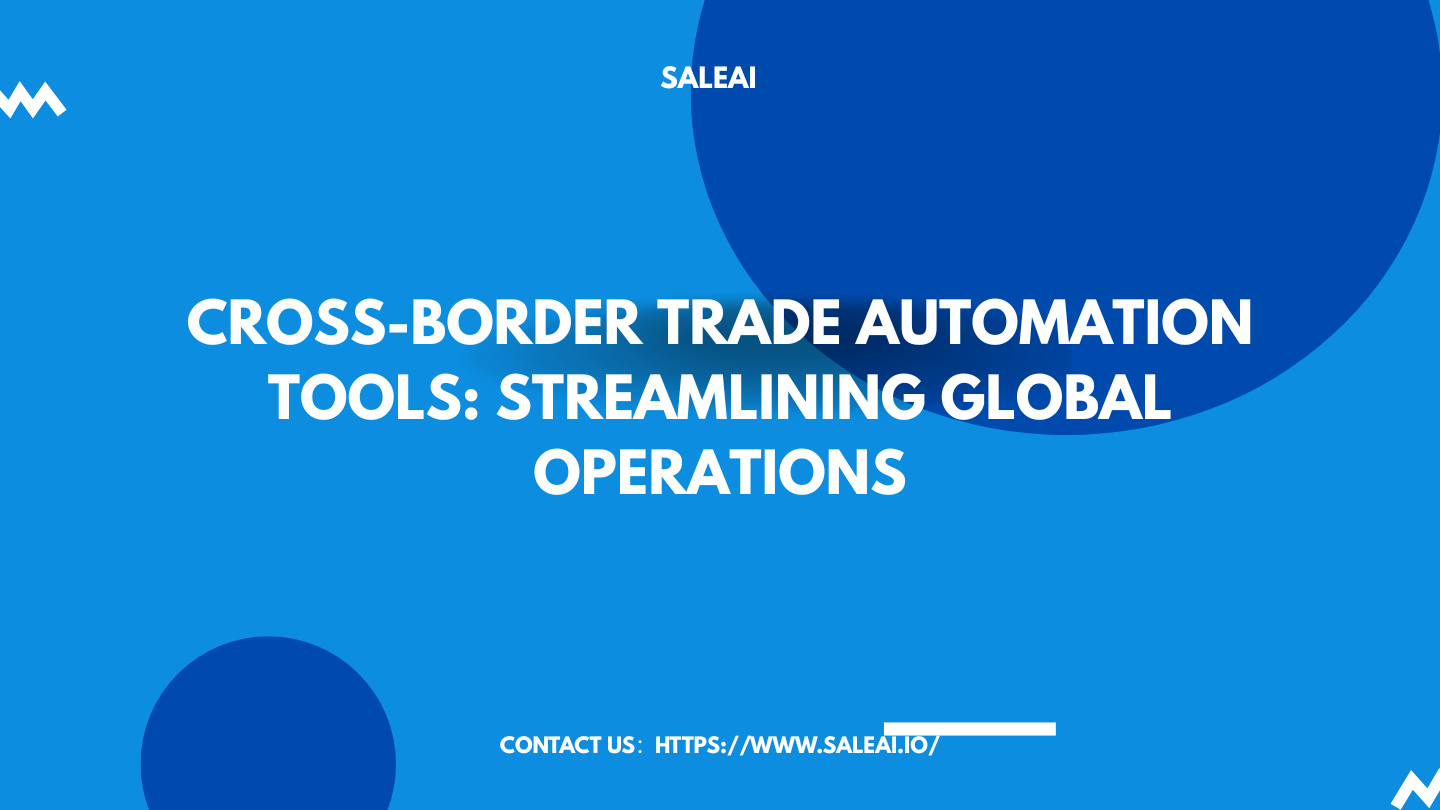Introduction: The Complexity of Cross-Border Trade
Cross-border trade forms the backbone of the global economy, yet it remains one of the most complex and challenging areas for businesses to navigate. From managing compliance with varying regulations to ensuring seamless logistics and mitigating risks, the intricacies of international trade can be overwhelming.
Traditional manual processes often lead to inefficiencies, delays, and increased operational costs. This is where cross-border trade automation tools come into play, transforming how businesses manage their global operations.
Automation tools, like those offered by SaleAI, streamline critical processes such as customs compliance, document management, logistics tracking, and buyer communication. By leveraging these tools, exporters can focus on growth rather than getting bogged down by administrative bottlenecks.
The Challenges of Cross-Border Trade
a. Regulatory Compliance
Every country has unique import/export regulations, tariffs, and documentation requirements. Staying compliant can be difficult, especially when operating in multiple regions.
b. Complex Supply Chains
Coordinating suppliers, manufacturers, and logistics providers across borders creates a labyrinth of moving parts, often leading to delays and miscommunication.
c. High Operational Costs
Manual systems for managing trade activities are resource-intensive, requiring significant time and personnel, driving up costs.
d. Limited Visibility
Without real-time updates, businesses struggle to track shipments, monitor inventory, and ensure on-time delivery.
e. Buyer Communication Gaps
Handling inquiries, order updates, and follow-ups manually can result in inconsistent communication, affecting buyer satisfaction.
What Are Cross-Border Trade Automation Tools?
Cross-border trade automation tools are software solutions designed to automate, optimize, and simplify processes involved in international trade. These tools:
- Automate compliance checks and documentation.
- Streamline shipping and logistics operations.
- Provide real-time visibility into trade activities.
- Enable seamless communication with buyers and partners.
SaleAI’s automation tools go a step further by integrating AI-driven insights, ensuring that exporters not only streamline operations but also make data-driven decisions to enhance efficiency.
Key Features of Cross-Border Trade Automation Tools
a. Customs and Compliance Automation
SaleAI’s platform simplifies regulatory compliance by automating tasks such as:
- Generating accurate customs documentation.
- Performing real-time checks against regional trade regulations.
- Ensuring tariff and tax calculations are error-free.
By reducing the risk of non-compliance, businesses avoid costly fines and delays.
b. Logistics Optimization
Automation tools streamline the logistics process by:
- Coordinating with multiple carriers and freight forwarders.
- Tracking shipments in real time with GPS integration.
- Providing automated alerts for delays or disruptions.
With SaleAI’s tools, exporters can proactively address logistics issues before they escalate.
c. Document Management
Cross-border trade involves a significant amount of paperwork, from invoices to certificates of origin. Automation tools handle:
- Digitization and storage of trade documents.
- Automatic generation of shipping labels and compliance forms.
- Secure sharing of documents with stakeholders.
d. Real-Time Data and Insights
SaleAI provides exporters with dashboards that offer:
- Real-time updates on shipment statuses.
- Predictive analytics to forecast delays or risks.
- Insights into regional trade trends and buyer activity.
e. Buyer Engagement Automation
Seamless communication is key to building buyer trust. SaleAI’s automation tools enable:
- Automated order confirmations and updates.
- Personalized follow-ups and offers based on buyer behavior.
- Multi-channel communication through email, WhatsApp, and LinkedIn.
How Cross-Border Trade Automation Benefits Exporters
a. Efficiency Gains
Automation eliminates repetitive manual tasks, allowing teams to focus on strategic activities.
b. Cost Savings
By reducing errors, fines, and delays, automation tools significantly lower operational costs.
c. Faster Time-to-Market
Automating compliance checks and logistics operations accelerates the time it takes for goods to reach international buyers.
d. Improved Buyer Relationships
With automated updates and seamless communication, exporters can enhance buyer satisfaction and loyalty.
e. Risk Mitigation
Automation tools identify potential risks in advance, enabling businesses to take proactive measures.
Why Exporters Choose SaleAI for Trade Automation
a. End-to-End Solutions
SaleAI offers a comprehensive suite of tools that cover every aspect of cross-border trade, from compliance to buyer engagement.
b. AI-Driven Precision
SaleAI’s platform leverages AI to analyze trade data, predict risks, and recommend the best course of action.
c. User-Friendly Interface
Designed with exporters in mind, SaleAI’s platform is intuitive and easy to use, even for non-technical users.
d. Multi-Market Functionality
SaleAI supports compliance and logistics operations across multiple regions, making it ideal for businesses targeting diverse markets.
e. Scalability
Whether you’re a small exporter or a large enterprise, SaleAI’s tools scale with your business, ensuring consistent performance as you grow.
Real-World Applications of Cross-Border Trade Automation
a. A Food Exporter Streamlines Customs Compliance
A mid-sized food exporter struggled with frequent customs delays due to inconsistent documentation. By implementing SaleAI’s automation tools, they reduced delays by 80% and improved on-time delivery rates.
b. A Clothing Manufacturer Optimizes Logistics
A clothing manufacturer used SaleAI’s logistics automation tools to track shipments in real time and mitigate disruptions caused by port congestion. This resulted in a 25% reduction in shipping costs.
c. A Machinery Exporter Enhances Buyer Communication
A machinery exporter leveraged SaleAI’s multi-channel communication tools to automate order updates and follow-ups, boosting buyer satisfaction and repeat orders by 30%.
The Future of Cross-Border Trade Automation
As technology continues to evolve, cross-border trade automation tools will become even more advanced. Here are some trends to watch:
a. Blockchain Integration
Blockchain technology will enhance transparency and security in trade operations, particularly in areas like documentation and payment tracking.
b. IoT-Driven Logistics
IoT-enabled devices will provide real-time data on shipments, enabling exporters to monitor conditions such as temperature and humidity for sensitive goods.
c. AI-Powered Predictions
AI will further enhance predictive analytics, allowing exporters to anticipate market changes, demand fluctuations, and logistical challenges with greater accuracy.
d. Enhanced Buyer Experiences
Automation tools will incorporate advanced personalization features, delivering highly tailored communication and offers to buyers.
Conclusion: Automate and Optimize with SaleAI
In a competitive global trade landscape, relying on manual processes is no longer viable. Cross-border trade automation tools are essential for exporters looking to optimize operations, reduce costs, and deliver exceptional buyer experiences.
SaleAI offers a cutting-edge platform that combines AI-driven insights, automation, and user-friendly tools to transform how exporters manage cross-border trade. From compliance to logistics and buyer engagement, SaleAI provides the end-to-end automation exporters need to thrive in a complex global market.



